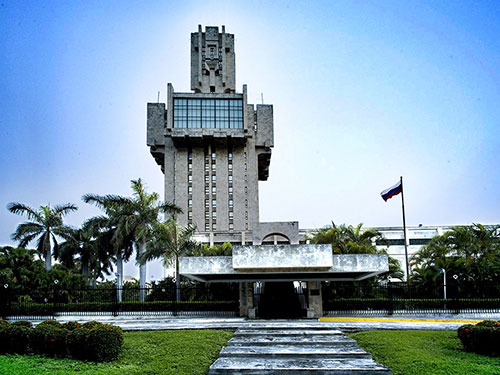
This article was originally published by the Jamestown Foundation on 30 October, 2015. Republished with permission.
Despite all of the other major foreign policy issues on its agenda, Russia has not forgotten Cuba. Indeed, it appears that Moscow’s strategic interest in this Caribbean island country has grown steadily, despite reported stagnation in their bilateral economic ties (House.gov, October 22). Recently, Russian Deputy Prime Minister Dmitry Rogozin announced plans to establish a signals calibration center in Cuba for Russia’s Global Navigation Satellite System, more commonly known as GLONASS—the Russian equivalent of the United States’ Global Positioning System (GPS). He also announced that Russia may set up an aviation engineering center in Cuba (TASS, October 22). These initiatives are not coincidences or wholly new gambits. Russia has sought to reestablish military bases in Cuba for some time. For instance, in February 2014, Defense Minister Sergei Shoigu announced that Moscow was seeking a network of global naval bases that included Cuba and Nicaragua; and Russia could be discussing similar arrangements with Argentina as well (RIA Novosti, February 26, 2014). Although Moscow’s top diplomat, Sergei Lavrov, denied that Russia was seeking or needs foreign bases, he did admit that his country wants “repair and maintenance stations” for its ocean-going fleet. Yet, at the same time, Shoigu observed that Moscow not only wanted the use of ports for its ships but also installations for the refueling of its long-range bombers (TASS, March 17, 2014).
Shoigu subsequently declared, in November 2014: “Given the situation that has developed, we have been forced to provide a military presence in the western part of the Atlantic Ocean, in the eastern part of the Pacific Ocean, and in the waters of the Caribbean Basin and the Gulf of Mexico.” His remarks signified the escalation of Moscow’s decision to challenge the United States militarily as well as in more general strategic terms throughout the Americas. Furthermore, Shoigu emphasized the need for aerial reconnaissance of foreign (i.e., US) militaries using long-range aviation, along with training missions for these pilots in these specific areas (Krasnaya Zvezda, November 13, 2014). In a further expansion of Russia’s military investment in the Western Hemisphere, Shoigu’s deputy minister Anatoly Antonov indicated the following month that Russia plans to build up military and military-technical cooperation with Latin American countries by establishing logistics support (MTO) facilities there for ship calls and by using local airfields in Cuba, Venezuela and Nicaragua. Although he denied that Russia was interested in bases, clearly that is exactly what is involved here—even if it is being arranged, in imitation of US naval presence in Asia, as “places not bases” (Mil.ru, December 24, 2014).
Thus, in light of such statements by defense ministry officials, Deputy Prime Minister Rogozin’s recent remarks reflect a long-term and continuing policy that enjoys considerable strategic backing in Moscow. Igor Korotchenko, the editor-in-chief of the Russian magazine National Defense, has observed that Cuba is of interest to Russia as a port of call for warships and nuclear submarines on missions in the Western Hemisphere as well as for long-range aircraft making scheduled landings for rest and refueling. Following President Vladimir Putin’s Latin American tour in July 2014, as well as after Shoigu visited Cuba in February 2015, Russian media was awash with rumors of the possible reactivation of the Lourdes electronic and signals intelligence facility (see EDM, July 22, 2014; Pravda.ru, February 17, 2015). Apparently, an agreement exists in principle to reopen Lourdes; and if implemented, this would provide Moscow with a significant intelligence gathering boost in the Western Hemisphere (Voice of Russia, July 16, 2014). Indeed according to one report, many Russian politicians and experts view Cuba as “an unsinkable aircraft carrier” and springboard in the event of a Russo-US confrontation (Russia Direct, August 6).
As Shoigu’s remarks also indicate, Cuba is by no means the only focal point of Russian interest in the Western Hemisphere. Nicaragua, Argentina, Ecuador and Venezuela are all areas of considerable interest to Moscow in its anti-US campaign (see EDM, July 22, 2014; April 8, 2015). Moreover, as the foregoing evidence indicates, the current economic crisis has likely not constrained Russia from seeking strategic and military points of access in Cuba or throughout Latin America.
The reopening of Cuban relations with the US led Russian experts to wonder if Russia “has lost” Cuba (Russia Direct, April 17), even if Foreign Minister Lavrov has sternously denied such worries publicly (Sputnik News, March 21). But the many Western reports that Cuban forces or officers have joined the Russian military campaign in Syria (TASS, October 18) suggest that despite the reopening of ties with Washington, the government in Havana still aligns its actions strongly with Moscow. Therefore, Russian threats in Ukraine, Europe and Syria will increasingly compete with the challenge posed by Moscow’s efforts to establish strategic beachheads, both military and non-military, in Latin America. Such attempts are serious, possess a long-term persistent character, and allow Russia to challenge the US at low cost with “house money” in pursuit of considerable gains. It would be a mistake to ignore Russian activities here.
Dr. Stephen Blank is a Senior Fellow and resident Russia expert at the American Foreign Policy Council. Previously, he worked as a professor at the Strategic Studies Institute of the U.S. Army War College at Carlisle Barracks, PA. The views expressed here do not represent those of the U.S. Army, Defense Department or the U.S. Government.
For more information on issues and events that shape our world, please visit ISN Security Watch or browse our resources.

